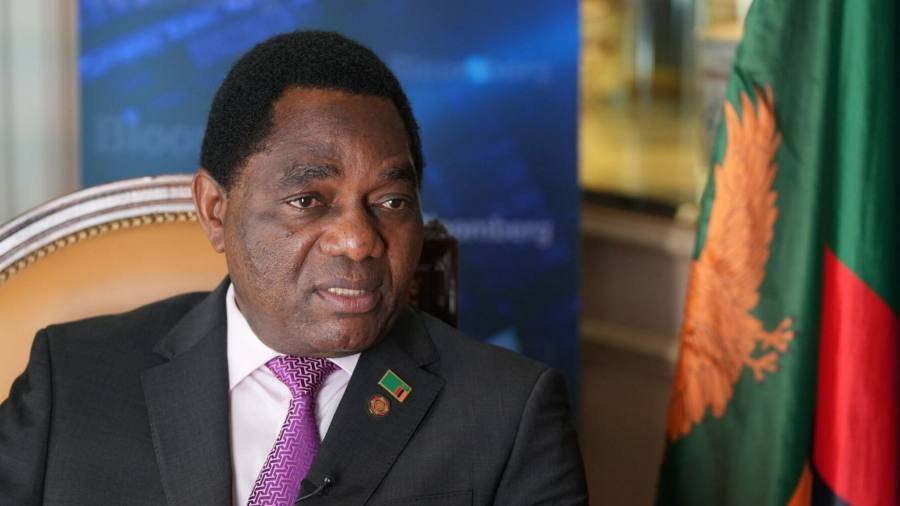Receive free Zambia updates
We’ll send you a myFT Daily Digest email rounding up the latest Zambia news every morning.
China and other creditors have reached a deal to restructure billions of dollars of loans to Zambia, ending a long impasse over the African nation’s 2020 default that exposed a rift between Beijing and western lenders over how to resolve a wave of debt crises in the developing world.
Zambia’s President Hakainde Hichilema praised Chinese president Xi Jinping on Friday “for helping us reach this significant milestone” after lenders led by China agreed to rearrange $6.3bn in loans, in a deal that French president Emmanuel Macron’s government helped to seal at the global finance and climate summit in Paris.
“We are fully aware that there is still a considerable amount of work ahead of us,” Hichilema added, reflecting that Zambia still had to iron out terms with each bilateral lender and strike a separate deal to restructure another $6.8bn in private debts.
Africa’s second-biggest copper producer had been left in financial limbo and unable to continue accessing a $1.3bn IMF bailout while China, the country’s biggest creditor, and other lenders clashed for months over a proposal to reduce by about half the value of almost $13bn of overall external debts.
Under the breakthrough, bilateral lenders led by China have agreed to a three-year grace period on interest payments and to extend maturities, paving the way for Zambia to resume funding from the IMF and begin private creditor talks.
Unusually among debt restructuring deals with official creditors, the agreement will also provide for less debt relief in the event that Zambia’s economy fares better than expected in the next few years.
“This unique and innovative agreement specifies both a baseline and a contingent treatment that would be automatically triggered if the assessment of Zambia’s economic performance and policies improves,” said Kristalina Georgieva, the IMF’s managing director.
Analysts have said that more detail is needed on the amount of debt relief that Zambia will actually receive if its economy improves.
The agreement was a diplomatic win for Macron at the Paris summit that has brought world leaders together to discuss reforms to the lending system between richer and poorer countries.
The Zambian deal will also raise hopes for other countries such as Ghana and Ethiopia, which are in similar talks to restructure debts dominated by loans from China. Beijing has become the single biggest lender to the developing world in the last decade.
China has been reluctant to accept direct writedowns of foreign loans by its banks, and in Zambia’s case it had proposed multilateral development lenders such as the World Bank take the unprecedented step of joining the restructuring.
A debt investor involved in the talks said development banks were likely to provide concessional lending rather than writedowns as a way of unlocking an agreement.
Out of concerns for domestic financial stability, Zambia has excluded its local currency bonds from the restructuring, even foreign holdings of this debt. The finance ministry said on Thursday that official creditors had agreed to accept this position.
The investor said foreign buyers of Lusaka’s domestic public debt appeared to have reduced their holdings from $3.2bn to less than $2bn since the end of last year, on fears that domestic borrowing could be included in the restructuring, as in Ghana and Sri Lanka.
The finance ministry last October said servicing those holdings would absorb about 80 per cent of the money available to repay external debts.
Eswar Prasad, professor of economics at Cornell University, said: “For China, the endgame seems to be a resolution that limits its financial losses while spreading more broadly the blame for the distressing and untenable situation that many highly indebted economies find themselves in.”
Investment firm Lazard advised Zambia in its negotiations with creditors.
Read the full article here




